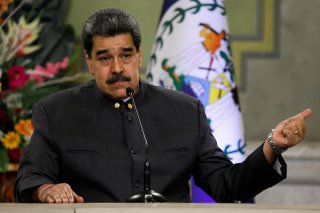Will Biden Lead on Venezuela?
Today’s advances will not fundamentally change the situation in Venezuela, but they will open up opportunities for future transformation of the country.
The Biden administration just opened another door for change in Venezuela—one door among many we’ve seen open in recent months for Nicolás Maduro. Will he take it? Or will empty promises and hollow rhetoric win the day?
The recent authorization of a license allowing for limited U.S. oil drilling in Venezuela—while scores of additional sanctions remain in place—is meant to show Maduro that sanctions relief is possible when steps are taken to alleviate the suffering of the Venezuelan people. This step was taken in tandem with the resumption of political and humanitarian negotiations in Mexico City between the Maduro administration and the opposition Unitary Platform and the announcement of a joint agreement for an UN-administered humanitarian relief program.
The actions come following a barrage of decisions in recent weeks by Maduro to show that he’s emerging from being a global pariah—highlighted by his shaking hands and chatting with leaders at COP27 and the resumption of diplomatic ties with Colombia under the new leadership of Gustavo Petro.
Since opposition leader Juan Guaidó first emerged on the scene in 2019, an anti-incumbency wave has brought in a bevy of left-leaning presidents across the region, granting Maduro more allies in positions of power than ever before in recent years. In this new context, the spirit of the Lima Group has lost relevance, and a new paradigm is needed. The United States and the rest of the hemisphere now have an opportunity to refresh and rethink the regional approach to Venezuela. The truth is that immediate and visceral change is not likely in the short term. Rather, working collectively on pragmatic, practical agreements will create momentum for greater transformation in Venezuela.
So what might be in the cards in the negotiations? The opposition aims to establish conditions for free and fair elections during the upcoming 2024 presidential election, to protect human rights, and to secure the release of hundreds of political prisoners. The Maduro government seeks greater international legitimacy and the loosening of sectoral sanctions from the United States, primarily those targeting the oil industry.
Beyond the politicking, these negotiations have the very real potential to change the lives of millions by addressing humanitarian needs such as healthcare, food security, education, and clean water and sanitation. Following hard losses for Democrats in Florida and the election of a divided Congress, the lame-duck session over the next few weeks is a rare period of reduced domestic political pressures.
This is an opportunity to show productive advances, and the United States should continue to show leadership at a regional level and support the negotiation process, as well as help promote a shifting regional strategy to Venezuela’s twin crises. Now is the time to advance a constructive approach that is about U.S. interests—rather than caving to Florida politics—and achieves real, tangible results for Venezuelans, including family and friends of Venezuelan-Americans in Florida and elsewhere across the United States.
Even outside of Venezuela, the country’s negotiations in Mexico City are likely to reverberate across both Latin America and the United States. If achieved, improved conditions in Venezuela will ease the pressures for migration, as well as build the path for development in the diaspora, creating opportunities for business and trade. Venezuela was once Latin America’s richest country with great trading ties to the United States and Europe. Today, the United States has just one remaining private company in the country, while other global powers like China and Russia have filled the gap. Greater engagement, including with business, can help promote democratic norms in Venezuela, spurring forth a virtuous cycle, while at the same time ensuring that the additional revenue does not further enrich and entrench the Maduro administration.
This post-election period is a great opportunity to demonstrate a foreign policy with practical outcomes, building on the Biden administration’s already active approach in promoting backchannel discussions and bringing Maduro and his allies to the negotiating table. With disinformation rife vis-à-vis Venezuela, coordinating communications and being upfront is absolutely critical. There is a climate of distrust and hyperpolarization regarding negotiations and engagement with the Maduro government. The only way to combat this is to communicate proactively and directly, showing the tangible results of dialogue.
Ultimately, today’s negotiations are important and constructive steps both to better people’s lives in the present and to build the momentum for greater change in the future. Today’s advances will not fundamentally change the situation in Venezuela, but they will open up opportunities for the future transformation of the country. Next year’s primaries, the 2024 presidential election, and the 2025 regional and parliamentary elections are all close on the horizon. The Biden administration should continue to work to help strengthen the democratic opposition in Venezuela and to support negotiations, crafting a path toward gradual democratic restoration.
Jason Marczak is Senior Director of the Atlantic Council’s Adrienne Arsht Latin America Center. He is on Twitter at: @jmarczak.
Image: Reuters.

